
| Eszter Fazekas | Art before the clearing committee |

|
István Szabó: Taking Sides
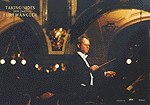 Stellan Skarsgard 48 KByte |
Looking for the "hiding" István Szabó in his films is an exciting game. He appears in almost all his movies and in the role of the "smallest episode actor" he always suggests the experience of common fate and his own personal involvement. Just to mention but a few examples: he is swimming across the River Danube behind András Bálint in Father, he is suspecting with Péter Andorai in the confectionary of Bizalom, he mingles with the crowd immediately behind Ralph Fiennes who is looking for spiritual peace in Sunshine. He is one of the famous architects who enabled the Berlin Theatre in Mephisto to celebrate the General's birthday, who resembles Göring. With his companion (director János Dömölky!) they are bowing to and greeting the celebrities arriving for the party, while discussing about the horrible costs and that this personality cult takes at least five days away from culture. "Pretty celebration", Szabó sighs sarcastically and adds, "it is awful that I have to take part in it". In the film it is only followed by Hendrik Höfgen's vision, which signals clearer than any word what role the power offers to the artist in our region, if it directs the performance of History. Szabó picks up the line of the plot with his film about Wilhelm Furtwängler where he let go of it with the character inspiring Höfgen's figure played by Gustav Grüdgens. Taking sides, shot on the basis of Ronald Harwood's drama returns here, to the totalitarian dictatorship of Germany, where Doctor Faustus was born and Klaus Mann lived, to the incestuous, infernal and typical Eastern-Central European interaction of art and power. The opening and closing images of the film are two points of moral importance in Furtwängler's life: two concerts. Furtwängler conducts Beethoven's Symphony of Fate in both. Höfgen's vision is fulfilled: the opening pictures show the 1934 concert in a cathedral, when Furtwängler could still have the chance to be the conductor of the New York Philharmonic Orchestra. Air raid sirens and blindingly white beams of light rip into the wonderfully expressive performance of the symphony and the golden brown and warm atmosphere of overflowing emotions. In the closing scene, Furtwängler is conducting the orchestra on the eve of Hitler's birthday in 1936 in original, archive recordings. We are shocked to see how Göbbels shakes hands with him after the concert and the detail that no one could realise then now becomes obvious after magnifying and replaying it several times: the tense maestro grips on his tissue, then wipes his wet palm after the handshake. These scenes synthesise the answer in the language of music and picture to Szabó's recurring fundamental question whether art can exist under authoritarian systems regardless of politics. Since for Szabó music is the "amateurish passion", the most spiritual and the clearest art, the question is how music can exist in this spaceless world of senses and emotions. The actual plot of the film - Furtwängler clearing procedure (see the Hungarian title that can be translated "confrontation") - wedges into this upsetting frame, which suggests the "attitude" of the director. The English title is Taking Sides, which is a psychological drama based on Ronald Harwood's thesis play, as well as contemporary records. Compared to Mephisto, the emphasis here is on different aspects. The question is not where compromises end and where agreement begins, because the process of Nazi Germany's making use of Furtwängler and other great artists cannot be seen. Here the pure faces tell the story instead of spectacular narratives; we see a moral drama, and the questions of art psychology also crop up here. The film clashes the aspects of "moral" and the "aesthetic state" raised by Kierkegaard in the European culture through the dual of Major Arnold Steve, who leads the investigation (Harvey Keitel) and Furtwängler (Stellan Skarsgĺrd). The coarse and relentless American stands upon the ground of black and white moral truth of the unshakeable aggressiveness of an outsider nation aiming to create order. For him, who smelt the "burning flesh" and saw the excavator in the Bergen-Belsen death camp clearing away the dead bodies, it is all the same what symbolic resistance was suggested by Furtwängler with the swing of his baton. He does not know the European culture or Furtwängler's personality, although he is said to be as talented a composer as Toscanini. Of course, he heard about Toscanini. He does not want to know about the artist's typical European dissention, about his argument that by conducting the pieces of the "three Bs" - Beethoven, Brahms and Bruckner -, he served a "political" purpose, he presented the mystical power of "freedom, humanity and truth" to those suffering. Furtwängler says that "a whole nation cannot emigrate", that is why he decided to undertake the different constraints. Steve whips out vulgar-psychological panels, such as vanity, and Karayan's role, whom he calls the "young bull". He was cleared of charges earlier, although he was member of the Nazi party. In the hope of the great catch - Furtwängler is his "Moby Dick" -, Steve concluded a legal agreement with Rode (Ulrich Tukur), the second violinist of the philharmonic orchestra, who "was not talented enough to be the first one". The ex-communist Nazi compromised himself as the former Gestapo-agent spying on Furtwängler. He reveals Furtwängler's weak point, such as his vanity, and provides information about his competition with "little K", his lovers and his ambivalent relationship with a critic who later lost his life under suspicious circumstances... The extraordinary tension of the film originates from the fact that the truth does not come to light as and when we expect it. Moreover, it fails to come up when we see the fate of the players, because the aspects are constantly revalorised and Szabó does not intend to pass a judgement. (Szabó was even said to have exempted Furtwängler in this respect.) Nevertheless, the film only presents the procedure during which he is cleared, because in the legal sense he could not be found guilty. Seeing the struggle of Major Steve and Furtwängler's attacking and defending arguments, we feel that we know everything about the basic question already and the verdict will soon be born within us. However, the psychological truth is that if somebody is interrogated in such an aggressive way, as the conductor charged with co-operation, they will only be capable of grim defence and self-verification, which becomes more and more obvious for the audience. The major, an insurance detective in civilian life - it is typical that in such cases the procedure runs according to the preconception, the truth of the party placing the order - would foist all the Nazi sins on Furtwängler. Steve flew across the ocean with the conviction that every German was a Nazi. The decent ones had all emigrated in due time. This was the conclusion he could draw after thoroughly studying Leni Riefenstahl's propaganda movies. His instructor, a colonel drew his attention to the fact that Hitler was unanimously cheered by the fanatic crowd in the imperial assembly. It is all too well known for us, since finding the scapegoat worked similarly in another totalitarian system as well. Rákosi had to "build socialism with ten million Fascists". During the proceedings Steve's helpers, both deeply involved in the case - Emmy, the secretary, daughter of Colonel Straube, who was executed for being a resistance fighter (Birgit Minichmayr) and adjutant David Wills, an American of German-Jewish origin (Moritz Bleibtreu), who was sent to the United States by his parents, but they themselves could not make it - point out that not only one moral truth exists, there are deeper ones than the one the major represents. The greatest achievement of the film is its consistently polyphonic structure and that it carries out the viewpoint change formally. Subconscious appears in the pictures, in music, with counterpoints, always offering newer and deeper viewpoints as compared to the ideological dialogues. We believe that the rough major is right and we agree that Furtwängler's defence is hypocritical about the separation of arts and politics, about the protection of Hindemith and others queuing up for help (which the incidental defender, Wills, also refers to, saying it is included in the documentation of the Nürnberg trial), while the Nazis proclaimed their typical lectures based on creative interpretation with such triumph that can only be compared to how Picasso's painting strengthened the self-esteem of the French... Nevertheless we hate the major for his law crushing military manner, although we are aware that if he were a more educated man, the confrontation procedure did not have such a high stake. We cannot take sides, but we see something else on the faces. Photographer Lajos Koltai pans the faces, his camera sometimes slips into the heads, beyond the masks. He shows the self-inducing training, the despair, the extraordinary effort on the face of the self-confident major to "kick the Nazi butler in the balls" in vain. When he is focusing on Skargĺrd's half bent head, we can see the disunion, the disturbed rumination, all that cannot simply be confessed, and we are too afraid to confess even to ourselves - the fear, the narcissism, the self-deception -, while he is reading out his concept about the purity of art aloud. Emotions almost strangle the viewer. The golden lights, the contrasting lights and close-ups on the face give painting-like atmosphere to these subconscious procedures that affect human communication more deeply than the speech... Emotionally we may have made our decision here, we annulated Furtwängler's plea...But then the orchestra starts to play Adagio of Bruckner's Symphony VII, conducted by Furtwängler. The charge is extremely frightening: when "the Satan died" it was played on German radio, not Karayan's recording. "He was the favourite, not the young party member, since he was so remarkable, and he did not have to join the party". Paradoxically, when hearing the music, we feel the physical delight and the doubt, as if the ideal, independent existence of the art proclaimed since German romanticism - Furtwängler also referred to - were in fact true, when he said "the only performance of the musical piece perfectly grabbed terror". Here we would be inclined to exempt Furtwängler. The depth of these pictures and of Szabó's description of character manifests itself by showing that Furtwängler does not crack under the burden of serious allegations or because his baton was broken. We can see contradictory emotions on his humiliated face (disgust, despair, self-defence and the beauty of feeling the music), when he is listening to his own recording and feels the sympathy and the admiration of the two young people - these real victims - for his art. He haggardly admits that he should have accepted the American offer back in 1934, then on his way out he falls over, then walks down the stairs, when Wills starts to play the Symphony of Fate Furtwängler conducted, and he turns up the volume, when the major reports to his superior that he "could not bring him down..." (Emmy, the only person whom the major feels respect for, because of her suffering, for being a woman, shouted at him earlier in tears that the Gestapo interrogated her in the same way.) During the symphony we can see her face, as she melts into music after the re-experienced humiliations and tearful softness shines in her eyes. Hearing Beethoven, Furtwängler hesitates in the stairway for a second, then continues... ... the viewers would already start packing their things by this point, when the archive recording of Göbbels' handshake is played. This is the moment when we quote Dostoyevsky in ourselves: "reality surpasses the imagination". It is as powerful as the emblematic handshake in Mephisto. The environment provides a sharp contract to the inside. Post-war Berlin is in ruins, all we can hear is dullness, the noise of ruin removal, we see the dust floating in the pale light and stare at the smashed windows. The atmosphere of deterioration and desertedness becomes complete when the imperial eagle falls off the top of a house. After the war there is no warmth in light. In the dreary neon lights of the American dance party Wills and Emmy feel the coldness and the alienation of the victorious power's lifestyle. The only continuity is perhaps riding their tandem bikes in the woods, since the anthropomorphous autumn landscape with its glowing sunset colours surrounds them with the beams of love. The new dimension of questions is opened up by the figure of Colonel Dimsic, a museum director in civilian life. He was introduced into the film by Szabó; his figure does not appear in Harwood's drama, although it does in real history. The well-known Russian film-critic, Alexander Troshin, told about Dimsic, his father-in-law(!) in Szonda on the Hungarian radio. The duty of the arts historian-Germanist was to persuade German artists to stay or to return to German territories under Soviet influence. Oleg Tabakov, playing Oblomov, enriches the colonel's character with "ontological" qualities known from Russian literature: extreme sentimentalism, sensitivity and humiliation, cunning. In his role of the music-loving colonel, he broadens the methods of interpretations to include totalitarian systems in general. Dimsic is bargaining over Furtwängler in a high-pitched voice with the stubborn Steve, as if arguing over paintings by Braque and Monet with the French. For him it is obvious that "in dictatorship art is owned by the party", but it is a moral question for the Americans. He would offer five conductors for Furtwängler, because he exactly knows how much he is worth. While they are throwing their own truths at each other in an alcoholic ecstasy - Steve underlines the importance of the verdict and repeats the simplified formula of good and bad, and Dimsic demands greater empathy in hope of a new "booty" -, the portrayal makes us feel that neither of them are autonomous creatures, but are the victims of their own systems. Steve would like to live up to the expectations of his commander, just like Dimsic. When in his drunken frenzy, spitting of hatred, Steve threatens with "killing the music clown", Dimsic cries out: "then I will be killed, too". Then Steve staggers home to take up the fight with renewed effort and starts watching the "death camp movie". In the film the narrator blares that every German was co-operating with the Nazis, but he falls asleep drunk with his back to the film. István Szabó's "German" film is unbelievably Hungarian, in spite of the fact that apart form Lajos Koltai and costume designer Györgyi Szakács, it has no other Hungarian link, as we would expect. Szabó's "side taking" lies in the procedure that he forces upon the viewer with his objective description. He makes us decide in this all too well known situation ourselves. Let us place the clearing committees inside. Nowadays, when culture is generally pushed into the background, when there are sharply divided groups everywhere, when our attitude to the world is pre-determined, if you like it is a question of emotion and passion, and as such, it is extreme, when in the name of the ultimate truth, emotions clash every day, when the traditionally "European" values and the moral responsibility of the individual are dying out...we should be brave and want to use our mind to change viewpoint before taking sides. We should begin thinking about ourselves, this is how we can face the intellectual state of our society, which we created ourselves. We must learn about the facts swept under the carpet so that we could get rid of our past. Although the infernal 20th century proved that there were no clearly separable truths, because they are frequently amorphous and physically incomprehensible, and that is where the horror originates from. We should examine our fears and if we can identify with them, we can be the servants of any extreme ideology or system, furthermore, even become brutal. Apart from this film, Szabó's two other films Bizalom and Sunshine also speak about these fears, torments and the consequences. In the figure of Bizalom's illegal communist - who is afraid of Gestapo and the clearing committees, as well as his lovers (Péter Andorai) -, Szabó helps us experience the psychological roots of the Stalinist era based on informers and show trials. This figure is the forerunner of Iván Sors, who is the witness of his father's brutal execution in the work camp, and who later joins ÁVH (Hungarian State Defence Authority) (Ralph Fiennes, Sunshine). Both figures belong to the type that generates further suffering, looks for a scapegoat and enjoys authoritarian methods in the name of canonised truths, owing to his experiences and the incomprehensible tortures. In his opening speech of this year's Film Week, István Szabó wished Hungarian film to have the "strictness of self-estimation". His consistency is signalled by the episode role of the "architect" in Mephisto. We admit that often we are unable to be independent of the society, the ways of thinking which surround us, although we have a different opinion. We also find him on the tram of Taking Sides, on a tram in Berlin, which is a wonderful, linking metaphor of Szabó's films. With subdued calmness, he carefully looks into the humiliated Furtwängler's face. With the experience of someone who knows that this internal process should be faced at least once in our life, although clearing committees can be survived. And it is not only the "responsibility of writers". Translated by Adrea Danyi
| 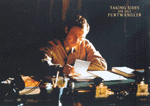 Harvey Keitel 58 KByte
| 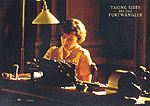 Birgit Minichmayr 61 KByte
| 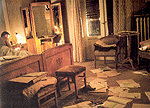 The photos has been taken by Joseph Gallus Rittenberg at the shooting of Taking Sides photo by Joseph Gallus Rittenberg79 KByte
| 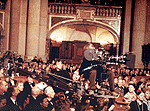 96 KByte
|  Harvey Keitel 94 KByte
|  114 KByte
| 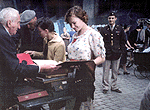 Birgit Minichmayr, Moritz Bleibtreu 75 KByte |